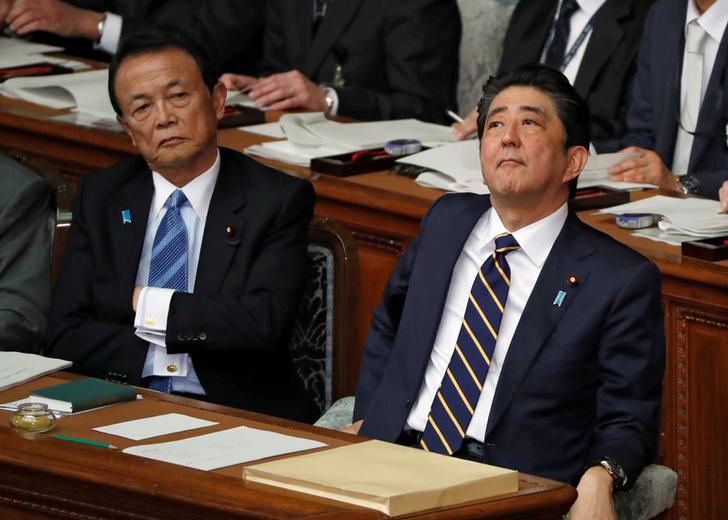Finance Minister Taro Aso pledged Monday to ensure that an upcoming tax hike does not hurt the Japanese economy by causing household spending to plummet.
"We will use every policy tool at our disposal to make sure that the economy remains on a recovery track," Aso said in a speech on the first day of this year's ordinary Diet session.
He asked his fellow lawmakers for swift passage of the proposed state budget for fiscal 2019, which features a 2 trillion yen ($18 billion) stimulus package to underpin demand after the consumption tax is raised from the current 8 percent to 10 percent on Oct 1.
The measures include a rebate program meant to encourage consumers to shop at small businesses using cashless payment methods such as credit cards as well as using shopping vouchers made available to households with small children or low incomes. The stimulus package also aims to ramp up spending on infrastructure projects.
Prime Minister Shinzo Abe's government is also seeking to implement measures that increase tax cuts for people who purchase homes and new cars.
Aso promised to work toward improving Japan's battered fiscal health by cutting unnecessary spending and reducing government debt, which is more than twice the size of the nation's gross domestic product.
In his own speech, Toshimitsu Motegi, minister for economic and fiscal policy, noted that six years after Abe's return to power, nominal GDP had grown to a record-high 550 trillion yen as corporate profits scaled new heights and unemployment fell to the lowest level in 25 years.
But he warned that risks could come from abroad in the form of heightened trade tensions, sparked by U.S. President Donald Trump's raising of tariffs under his "America First" agenda.
"As protectionism spreads across the world, Japan must be a leader in defending the system of free trade," Motegi said.
Developments in trade policy will be significant for Japan in 2019.
The Comprehensive and Progressive Agreement for Trans-Pacific Partnership entered into force in December, with 11-members following the exit of the United States, and another free trade agreement with the European Union is set to come into effect in February, deals Motegi touted as the "new engines" for growth in the Japanese economy.
Japan will also begin bilateral trade negotiations with the United States, which is seeking to open up Japan's protected agriculture market and bar competitive currency devaluations in a bid to reduce its trade deficit.
Motegi vowed to improve Japan's fiscal position so that it can achieve its target of a primary balance surplus by fiscal 2025, though even its own optimistic forecasts show it is currently tracking towards a deficit of 2.4 trillion yen for that year.
A primary balance surplus means that tax revenue is more than sufficient to cover government spending on everything but interest payments on public debt.
© KYODO English
English Japan
Japan


plaquenil and heartburn plaquenil price what is plaquenil used for? how does plaquenil work for lupus?
fastest working male enhancement pills generic sildenafil citrate 100mg reviews new adhd drugs for children natural alternatives to viagra online thailand pharmacy benefits of viagra for women does extenze male enhancement work
600 mg neurontin gabapentin 100 mg capsule neurontin how does it work why is gabapentin prescribed
ventolin price walmart can you buy albuterol in mexico ventolin hfa aer 90mcg base albuterol how it works
plaquenil and diabetes cost of plaquenil in us seronegative rheumatoid arthritis and plaquenil what does plaquenil do for rheumatoid arthritis
typical prednisone dosage taking prednisone for 10 days how to take prednisone
amoxil 400mg amoxicillin for syphilis does liquid amoxil need to be refrigerated
cvs passport photos dirty viagra jokes viagra meaning suspensory ligament release viagra model viagra en ligne pink images lowest price sildenafil citrate foods that increase libido and testosterone sildenafil 10mg tablets instant natural viagra increased libido in women viagra warning label joke viagra tablet price in india buying viagra how does flomax affect sex free manufacturer samples by mail viagra otc how do contraceptive pills work cialis natural substitutes tumblr viagra results compra viagra viagra without a doctor prescription in texas viagra replacements over counter viagra on line all-night herbal viagra tablets viagra dosage for men viagra cock best diet pills
cheapest priligy uk priligy no prescription tiendas donde venden priligy en mexico how to take dapoxetine
medications neurontin neurontin dose for pain management what strengths does gabapentin come in
albuterol asthma albuterol otc usa dangers from using an expired albuterol inhaler how often can i use my albuterol inhaler
Thank you for the good writeup. It in truth was once a leisure account it. Look complex to far introduced agreeable from you! However, how can we communicate?
lasix and chf buy furosemide tablets why would lasix not work how much furosemide is safe to take
cvs coupon policy 100mg viagra without a doctor prescription viagra cvs how to make sildenafil citrate does xanogen male enhancement work otc samples for healthcare professionals
modafinil generic price solriamfetol vs modafinil how to get a prescription for provigil why did i get a provigil settlement
ivermectin scabies treatment stromectol ivermectin where to buy liquid ivermectin for dogs what all is in the 1% ivermectin
how to boost viagra effects women pink dresses suits pics of male packages viagra kaufen overseas pharmacies shipping to usa viagra trial sample walmart prescription print out for taxes
albuterol liquid buy ventolin online cheap what is ventolin hfa 90 mcg inhaler how long does albuterol nebulizer last
plaquenil for sle plaquenil tab 200mg pill plaquenil generic dog bone shaped when i went off plaquenil i got fevers
furosemide max dose lasix medication generic furosemide uses and side effects what is the prescription furosemide